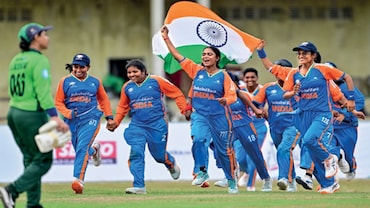#LivingMyPromise: The Extraordinary Indians Who Are Pledging Half Their Wealth To Charity
Promising to give away half of their wealth to charitable causes, these extraordinary Indians are setting a new milestone in philanthropy
 Shutterstock; illustrations by Keshav Kapil
Shutterstock; illustrations by Keshav Kapil
When Bill and Melinda Gates and Warren Buffet launched The Giving Pledge in August 2010, they invited high net worth individuals to dedicate more than half their fortunes to philanthropy. The movement grew rapidly and by 2017, there were 168 signatories from 21 nations. This is when word reached 47-year-old Girish Batra, a corporate executive from Bengaluru. A part-time volunteer at DaanUtsav—a pan-India giving week in October—Batra discussed starting a similar initiative in India with his fellow volunteers. But, instead of bringing together the super-rich, Batra proposed that well-heeled middle-class Indians—with a net worth of ₹1 crore or more—pledge to give away at least half their wealth over the course of their lives, or in their wills as a posthumous donation, to causes close to their hearts.
By August that year, the campaign, dubbed #LivingMyPromise (#LMP), went online and news began to spread. Venkat Krishnan N, founder of the non-profit GiveIndia, and among the first to take the pledge, and five more donors from DaanUtsav came on board. Today, a total of 27 signatories from across India have signed up, including actor, director and philanthropist, Rahul Bose. “Asking Indians to commit to something like this would have been preposterous earlier,” says Bose. But this, to him, is an indication of where philanthropy has reached in India. “This is not first level; this is talking to those who are a few steps in the journey, where they are willing to make this a way of life,” he says.
 “#LivingMyPromise is a platform for like-minded people to come together and pool their resources to make a larger impact,” says Girish Batra.
“#LivingMyPromise is a platform for like-minded people to come together and pool their resources to make a larger impact,” says Girish Batra.
What indeed ties the pledge takers is not their enormous fortunes, but their big, giving hearts. Most of them have grown up in average, middle-class homes, where frugality was tempered with generosity and social responsibility. Having learnt from strong, positive role models in their own lives, they have continued on the path of giving—donating funds, time and services to serve the needy.
While most of them shy away from the spotlight, even the most reluctant see value in making their pledge public. Delhi-based signatories Smita and Ulhas Vairagkar don’t believe that philanthropic support should be publicized. “However, we are persuaded that our pledge may possibly influence some more to think and maybe act in a similar direction,” they say.
“#LivingMyPromise isn’t an NGO. It does not collect or grant money. Each pledger makes an individual decision and offers a public declaration of their commitment to donate a sizeable portion of their wealth,” explains Batra. The core group emphasizes that this is for ordinary people who lead a ‘normal’ life, but have decided to make a difference nonetheless. And to help those who have the mindset, LMP offers advice on legal, financial and other practical aspects. Reader’s Digest met a small bunch of these ‘middle-class Azim Premjis’ to bring to you their stories.
 “I don’t want to blame governments. I just feel we all need to adopt a value system and focus on giving,” says Amith Prabhu.
“I don’t want to blame governments. I just feel we all need to adopt a value system and focus on giving,” says Amith Prabhu.
Amith Prabhu, Gurugram
Growing up in Mangalore, Karnataka, Amith Prabhu and his brother, had a “semi-luxurious life”. But strong middle-class values and a culture of generosity were drilled into them. “We got whatever we wanted, but we were taught never to be greedy and to give to others,” says Prabhu, 39, a Gurugram-based public-relations professional.
Prabhu’s mother earned around ₹5,000 monthly but always kept away a couple of months’ salary to offer as interest-free loans to the needy. His father, a professor, served mid-day meals to underprivileged students in his college. When he lost his mother at the relatively young age of 51—Prabhu was 21—he made a promise to himself—he would give to the needy whatever he inherited from his mother and in 2011, he started the Ethel Prabhu Foundation in her honour.
Prabhu did volunteer work after graduation, which made a lasting impact on him. “I came across several people who had done so much for others with no expectations.” As he took on various roles in his career, he continued to contemplate on the various means of wealth creation and sharing. This is when he came across #LivingMyPromise, and decided to take the plunge. Talking about why he pledged to donate half his earnings after he was gone, he says it was simple: “I knew I would earn enough and more for all my needs and also have a surplus that I can use to make lives of certain people better.”
His family is completely on board with this. “I built assets with the intention of giving them away in the future. It’s a personal choice. And my family respects that. The assets I have purchased with my wife will be disposed of by her in my absence in any way she wishes,” he adds. He has also pledged to donate his body for medical research.
Despite his many years in the PR world, Prabhu seems uncomfortable talking about his charity work. “I do not hesitate to respond though, hoping it will inspire more people to give. Charity is not about managing one’s reputation. It is about behaving with a conscience,” he says.
Prabhu has a suggestion for all those on the cusp of charity. “I wish everyone could make an effort to keep 10 per cent of their income for a worthy cause in their lifetime, and maybe, 100 per cent of all that they inherited for the needy afterwards.”
—By V. Kumaraswamy
 “We are cause agnostic. Social change requires thought and action and we support any group that is changing peoples’ lives for the better,” say Sriram Venkatraman and Mashqura Fareedi.
“We are cause agnostic. Social change requires thought and action and we support any group that is changing peoples’ lives for the better,” say Sriram Venkatraman and Mashqura Fareedi.
Sriram Venkatraman and Mashqura Fareedi, Bengaluru
For development professionals Sriram Venkatraman, 36, and Mashqura Fareedi, 39, “It felt like a ‘no-brainer’ because it is parting with something that never really was ours to keep and it made sense that it would go to social welfare.” Venkatraman came to know about the pledge in early 2019 through a social media post. “I discussed it with Mashqura and we were both excited about the initiative and wanted to act on it,” he recounts.
Having grown up in a setting heavily driven by philanthropy, the instinct to give came naturally to both. Venkatraman, originally from Chennai, moved to the social sector after seven years in consulting. Fareedi, from Darjeeling, was influenced early on by her mother to give. “In spite of the many hardships she faced, my mother started a school in one of the most remote parts of Darjeeling. So there was no running away from the fact that no matter what your means, you can still contribute,” she says. The pledge is just an extension of that belief for both.
Today, besides their annual contributions to various organizations, they have also pledged to donate half their wealth to charitable causes in their will. “However, after having signed up to #LMP, we want to be more consistent with our support and plan our contributions better,” says Venkatraman.
While the fear of not having saved enough for the future often cripples several well-intentioned people, Venkatraman and Fareedi assert that they did not harbour any doubts or fears about signing up to #LMP. In fact, Fareedi feels this has brought the two closer. “This would be the first time we are doing something together besides our work in our individual capacity. I would like to think of it as just the first step,” she says.
The couple realize that not every person may find it easy to sign up to the pledge. “Many of our friends have existing commitments that they need to honour first. But for many of us, especially the ones with no kids, this is also a great opportunity to plan our contributions. And for our generation, there are many like us out there who just want to know how. #LMP is a great way to do so,” says Venkatraman. “We hope we are able to encourage more people to join”.
—By Vanya Lochan
 “The philosophy is simple—you have, so you can; you can, so you give; you give, so you impact; you impact, so you change,” says Bharati Dasgupta.
“The philosophy is simple—you have, so you can; you can, so you give; you give, so you impact; you impact, so you change,” says Bharati Dasgupta.
Bharati Dasgupta, Mumbai
Since childhood, Dasgupta, now 76, had seen a steady stream of visitors welcomed to stay at their Mumbai family home. “They can’t come to Bombay and not have a place to stay. You must accommodate whoever comes, because you have something that they don’t,” she would hear her parents say.
This small but significant lesson in selflessness was engraved on young Dasgupta’s heart, and she remained true to her parents’ legacy ever since. After serving with the Indian Banks’ Association and heading her own consulting firm, Dasgupta took up full-time social work. In 2002, she, along with three other family members, founded Catalyst for Social Action (CSA), an NGO that works in the field of adoption and family-rights care for institutionalized children, a cause she came to love when her granddaughter was adopted. Over the next 10 years, she expanded CSA’s efforts across state lines and into the world of orphan care.
“When I first heard of the #LivingMyPromise campaign from Venkat (Krishnan) my first thought was, I would never fit into the Rs 1-crore bracket! But, with some careful scrutiny and research, I found that, between my house, savings and other assets, it all added up,” she smiles.
When asked if she ever felt bothered or concerned about neglecting her family by giving away a large portion of her wealth, she responds, “Not at all. I realized that my daughter and son-in-law, both successful professionals, were much less likely to need my money than those with little or no means.” But more than the financial support, Dasgupta sees a greater purpose to #LMP. “This was a great opportunity to make a lasting impact—a once-in-a-lifetime opportunity to build a middle-class ‘giving’ community, based on philanthropy. Together, we can create a whole new structure for bringing about change,” she says.
—By Ishani Nandi
 “Maybe we can’t end inequality in our lifetime, but we all have an obligation to do something,” says Meenakshi Ramesh.
“Maybe we can’t end inequality in our lifetime, but we all have an obligation to do something,” says Meenakshi Ramesh.
Meenakshi Ramesh, Chennai
For 49-year-old Meenakshi Ramesh, a social entrepreneur and passionate volunteer of kuppai (garbage) cleaning, it was her middle-class upbringing and her father’s values that played a big role in shaping her as a person. When her mother passed away, she stepped in to take on household responsibilities despite her young age. Her father, a self-made banking professional, remains an idol of selflessness for her and her two sisters every day. He was generous beyond measure and never once turned away someone in need. Says Ramesh, “My father said it takes a lot for someone to reach out for help. It takes their self-esteem and their pride. Don’t just think it’s my money; try to see what that money can do for them.”
Motivated by the security and success that an IIM-education brings, she chose to join the one in Ahmedabad, where she met her husband, Ramesh Mangaleswaran, whom she describes as “my partner in every sense—especially in our giving journey”. When they graduated in 1993, India was opening up like never before, presenting people like them with unprecedented opportunites. Within a few years, the couple was able to secure financial stability and began sharing their prosperity with those in need, beginning in small ways—making donations, volunteering time and expertise to NGOs or providing health insurance and yearly increments to their domestic help. When Krishnan, her classmate at IIM, inspired them to take the #LMP pledge, it was a natural transition for the couple. Though Ramesh feels they still have a long way to go to reach their pledged amount, she says having a clear goal serves as both reminder and motivation to continue the work.
—By Pratishtha Dobhal
 “If I can encourage someone through my presence, I am happy,” Bose says.
“If I can encourage someone through my presence, I am happy,” Bose says.
Rahul Bose, Mumbai
Social concerns and philanthropy have defined actor Rahul Bose, 52, for years now. Saddened by grave disparities, he started a foundation, 13 years ago, with underprivileged children who are being given the gift of education and groomed for social engineering in their own communities. Bose has donated 70 per cent of his earnings to this cause. So when Amit R. Chandra, MD and Head of Indian Operations at Bain Capital and a leading philanthropist, invited him to join the #LMP fold, he was more than happy. Already fired up by ideas of social change, he is a committed traveller on this revolutionary road today. “This is a much deeper calling—a testament to how you view the world, really, and what happiness means to you,” says Bose. Among the few famous Indians committed to philanthropy, Bose has dedicated his public profile and credibility to energizing the #LivingMyPromise campaign.
—By Sanghamitra Chakraborty






